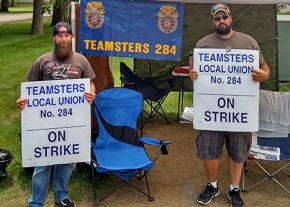On strike against an 84-hour workweek
reports on a strike in Ohio against one of the largest paper companies in the world--over management's outrageous demands for mandatory overtime.
WORKERS AT an International Paper factory in Delaware, Ohio are on strike against the company's demand of unlimited overtime for up to 84 hours a week: 12 hours a day for all seven days.
"[The company is] telling us, 'Oh, we're not going to use it,'" says Mike Schnitzler, who has worked at the factory for 21 years. "But if you're not going to use it, why ask for it? We have to fight for what we believe in--there's no family time or anything like that if you're working seven days a week, 12 hours a day."
The 130 workers, members of the Columbus-based Teamsters Local 284, had been without a contract since last summer when the company decided in April to implement its "last, best and final offer," which included the outrageous overtime provision.
In response, Local 284 launched an unfair labor practice strike, declaring that International Paper was not negotiating in good faith.
Roberto Rodriguez, who has been at the factory for 21 years, said that management has claimed that it would only require workers to work close to 84 hours a week if some type of disaster at another factory would require worker in Delaware to put in excessive hours in order to ensure that all of the company's orders got out on time.

But Rodriguez pointed out that this has happened before: Other factories have needed to temporarily shut down on several occasions, often due to mechanical issues, and workers at his factory have always volunteered to work extra hours necessary to get the orders out on time, without any contractual language about mandatory overtime being necessary.
For both Rodriguez and Schnitzler, the problem is being forced to work such excessive overtime. "To volunteer to get equipment back up and running is one thing," says Schnitzler. "To be told you have to do it is another."
Workers are also skeptical that management would not abuse the ability to force unlimited overtime. In fact, a few weeks before the strike, some workers were being forced to work 72 hours a week.
A FEW days into the strike International Paper was able to get an injunction limiting the number of workers who can picket in front of the entrances to the factory and warehouse to three. As they did in the recent Verizon strike on the East Coast and countless other strike, police have enforced this injunction, preventing workers from confronting and slowing down scabs on their way into the factory.
After winning the injunction, company managers further harassed their striking employees by frequently calling the police on picketers, although workers reported that this tactic mainly succeeded in getting the cops annoyed at the company for continually calling them over nothing.
The striking workers' spirits are still high even as their strike approaches two months. Nearby unions and community members often deliver food and beverages to show their support.
There was one occasion when strikers were threatened with a gun by a pizza delivery driver who was asked not to cross the picket line to deliver pizzas to the factory, but the community's response overall has been very positive. "For every one person who gives you a thumbs down," Schnitzler says, "you get 50 people honking or waving and showing support."
It seems that many people in the community agree with a point that Schnitzler made about why this strike is important, not just for members of Local 284, but for all workers:
This is a Fortune 500 company--one of the largest paper companies in the world. If they're successful in getting all of this stuff through, what's to stop other companies from doing the same thing? Nobody wants to live their life working in a factory and never getting out, never getting to spend time with their family.


